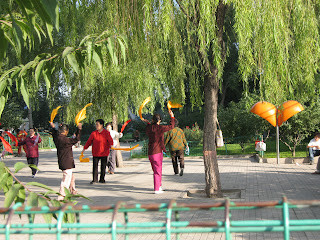~-*-~
Not sure what's wrong with me, but I have a feeling it's a salad I ate at IKEA a few days ago. I stayed home yesterday. Although, now I feel 90% better and today I'm busy at work avoiding work.
There is a small organic market called Lohao that just opened near my house. The prices are extremely fair on certain items, especially locally produced stuff. I bought a cheap bottle of wine, this coffee we love from Yunnan province, and some rather pretty ginger. Right next door to this market is an excellent Italian restaurant with great pizza, very authentic. Pizzas are around 45RMB (like $5.20) for a large that will feed two (or one Ariel) and it's like a nice little pizzeria in Milan. (No, seriously.)
This is from an e-mail I sent to my father. I sometimes feel like I'm sending e-mails that have more political content than what I have on my blog. I'd like to change that. Since my blog is already blocked in China (as are all blogs) I don't see the difference. What follows is a disorganized rant on Chinese politics:
"About six months ago I bought a DVD containing the complete BBC series on contemporary China on the street. (The BBC has the best Chinese news, period, and even has a decent Chinese language learning section.) The seller was a artsy Chinese guy in a mandarin silk jacket and long beard. All his movies were either art films or documentaries, some that I'd never seen, and he also had lots of bootleg music. His selection was excellent and he seemed to be doing it all himself. I bought a couple things from him, but didn't have a lot of cash, but he said he'd be back at the same time tomorrow. I came back, but he wasn't there and I never saw him in my neighborhood again. I hope he's alright, but I'm worried that since he was selling some high risk stuff he got in trouble.
It's hard to criticize or even recognize big problems here. I think an even bigger issue than central government nonsense is highly corrupt local government corruption. The Communist party actually has a very weak hold in people's minds and has been trying to win people back, so they usually only punish high-up party members if they absolutely must. Power is maintained by the fist, really, and few Chinese truly trust or care about the central government.
However, the government is not totally useless. Polices and changes enacted by Deng Xiaoping and furthered by current leadership (not Hu Jintao, who is more like a puppet) helped create this new China. The changes that have taken place, notably in the big cities, are astounding and on a scale that is barely imaginable. People are much, much wealthier and even have more rights to complain about superficial things like not enough subway lines or a backwards personal banking system. Things are being done for the "haves," that is certain. There is even a government approved gay health clinic in Beijing along with organic produce markets, solar power, "no car days," fuel efficient buses and spas. That being said, the countryside villages (even the poorer "hutong" neighborhoods in Beijing) are a stagnant mess and migrant workers flee in droves to work in sub-par conditions in the city. Local government is shockingly corrupt, even with child slave labor being discovered in a village months ago with local government in on the kidnapping. Fair education in China is a lie since a lot of them can't read characters or speak proper Chinese, spit inside of buildings, have never brushed their teeth, have their children crap on the sidewalk, do unsafe construction work, etc. City dwellers, on the whole, are disgusted with and ignore the "turen" (a rude term for farmers, literally "dirt people") English teachers who studied in small towns cannot speak English (trust me, I know about this especially!) since they haven't received a proper education beyond reading and writing. China is two countries: the villages and the cities. It's a matter of the have and have-nots, as is everything in the universe, I guess.
To end this rant I'd like to say that the quality of Chinese is improving. Chinese are gaining a sensitivity and more worldly, modern outlook EXTREMELY quickly. Chinese still remain, for the most part, apathetic towards their own culture, history and lack of rights. They've been beaten down, have recent memories of the crushing Cultural Revolution, and are just trying to eek out basic survival under a police state. This has, understandably, lead to cowardice, denial and disinterest. Communism will eventually change, this is obvious, and people will have more personal freedom. China will probably never be an America or Europe, but doesn't need to be. China's government will gradually expand more freedom onto its citizens while still maintaining strong, fairer control. Most outsiders have no idea how fast and impressively Chinese are changing their country, but it's a still a mess here and so much needs to be fixed."



















































